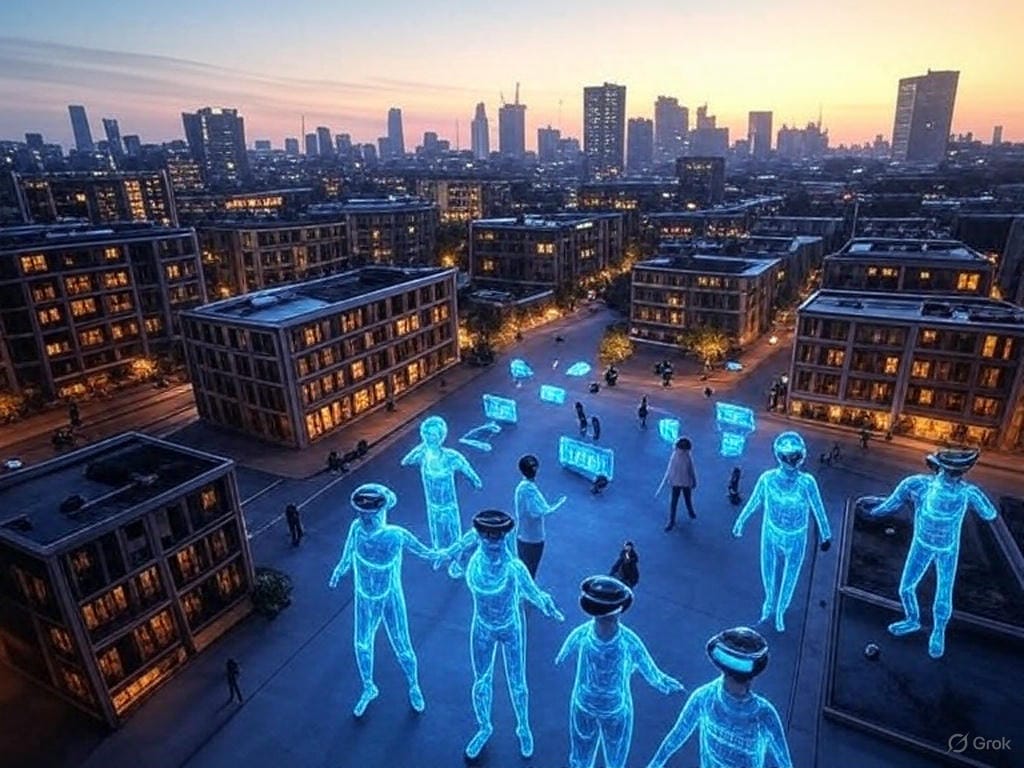VR Entertainment in the UK by 2050. Virtual reality (VR) has already started reshaping entertainment in the UK, with headsets like the Meta Quest 3 bringing immersive experiences to homes.
As we look toward 2050, VR entertainment could become a cornerstone of leisure, offering hyper-realistic gaming, social connections in virtual worlds, and new ethical challenges.
Let’s explore how VR might transform entertainment in cities like London, Edinburgh, and Bristol over the next 25 years, building on trends emerging in 2025.
Immersive Gaming: A New Reality for Players
By 2050, VR gaming in the UK could feel indistinguishable from reality.
Today, titles like Beat Saber on the Meta Quest show VR’s potential for interactive play.
In 2050, a gamer in Manchester might spend £200 on a VR headset that uses haptic suits and neural interfaces to simulate touch, smell, and even temperature in a fantasy RPG.
Imagine battling dragons in a virtual Scottish Highlands, feeling the heat of fire on your skin, all from your living room.
Multiplayer VR arenas—physical spaces where players gather—might pop up in cities like Birmingham, costing £15 per session.
However, physical side effects are a concern: 20% of VR users experience motion sickness today.
By 2050, adaptive tech, like eye-tracking to adjust visuals, will need to minimise discomfort for mass adoption.
Social VR Experiences: Connecting in Virtual Worlds
Social VR could redefine how Brits connect by 2050.
Platforms like VRChat already let users hang out in virtual spaces.
In 2050, friends in Cardiff and Glasgow might meet in a virtual pub, sharing a pint in a digital replica of their favourite local, all for a £5 monthly VR subscription.
Family gatherings could also go virtual—a grandparent in Cornwall might join a birthday party in London via VR, feeling as if they’re in the room.
This could help combat loneliness, which affected 9 million UK adults in 2023.
Yet, the digital divide—15% of UK adults lacked digital skills in 2023—might exclude some, and over-reliance on virtual interaction could weaken real-world bonds, requiring a balance between the two.
Ethical Considerations: Navigating a Virtual Frontier
VR entertainment in 2050 will bring ethical challenges to the forefront.
As VR becomes more immersive, addiction could rise—UK adults averaged 4 hours daily on screens in 2023, a figure that might double with VR.
A teen in Bristol might spend entire weekends in virtual worlds, impacting mental health, especially as 1 in 6 UK children faced mental health issues in 2023.
Data privacy will also be critical.
VR systems tracking eye movements, biometrics, and emotional responses could be exploited—data breaches affected 7% of UK schools in 2023, highlighting the risks.
Additionally, the energy demands of VR, from headsets to servers, might strain the grid, though renewable energy, which supplied 43% of UK electricity in 2023, could mitigate this.
Ethical guidelines and sustainable designs will be essential to ensure VR enhances lives without unintended consequences.
Social and Cultural Impacts
VR entertainment could reshape UK society by 2050.
Virtual concerts might let fans in Leeds “attend” a live gig in Los Angeles, boosting cultural access but potentially reducing physical venue attendance.
Education could benefit too—students in Belfast might explore VR history lessons, though the digital divide must be addressed to ensure inclusivity.
Culturally, VR could foster creativity, with platforms letting users in Liverpool design their own virtual worlds.
But it might also blur reality, raising questions about identity and authenticity in a world where anyone can be anyone online.
Balancing immersion with reality will be key to maintaining social cohesion.
What Shapes the Future?
The future of VR entertainment in the UK by 2050 will depend on several factors:
- Technology: Advances in haptics, neural interfaces, and energy-efficient hardware will drive immersion.
- Policy: Regulations on data privacy and screen time will shape user safety.
- Society: Cultural acceptance of VR as a primary entertainment medium will determine its reach.
- Environment: Sustainable energy solutions will be crucial to support VR’s growth.
A New Era of Entertainment Awaits
By 2050, VR entertainment in the UK could offer hyper-realistic gaming, virtual social connections, and new ways to experience culture, transforming how we play and connect.
From immersive adventures in Newcastle to virtual gatherings in Southampton, the future looks vivid—but only if ethical and accessibility challenges are met head-on.
The UK’s history of embracing entertainment tech, from cinema to streaming, suggests we’ll dive into this VR revolution.
Will you be gaming in a virtual world or meeting friends in a digital pub?
What’s Your Vision? Imagine VR entertainment in 2050: Are you exploring a virtual festival, or hosting a family party in VR?
Share your thoughts in the comments.
Let’s envision the future of fun together!
Hope you’ve found our article, VR Entertainment in the UK by 2050 useful.
Thank you for taking the time to read my post. If you’d like to add a comment or thought on this post, please use the comments section below. I can also be contacted via the online contact form. Keep up to date with the latest news on social media.

